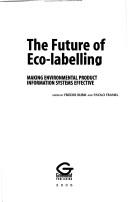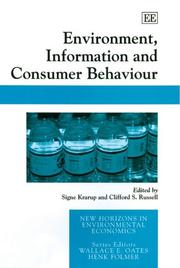| Listing 1 - 10 of 10 |
Sort by
|
Book
ISBN: 0190866039 0190866012 0190866020 Year: 2019 Publisher: New York, NY : Oxford University Press,
Abstract | Keywords | Export | Availability | Bookmark
 Loading...
Loading...Choose an application
- Reference Manager
- EndNote
- RefWorks (Direct export to RefWorks)
Modern consumers are confronted by a growing array of colorful eco-labels on everything from coffee to computers. Yet, not all of these eco-labels are trustworthy. Despite the existence of well-established best practices for eco-labeling, many labels remain little more than superficial exercises in 'greenwash.' How can consumers separate greenwash from genuine attempts to address environmental challenges? 'Beyond Greenwash' systematically investigates the credibility of transnational eco-labeling in a global and cross-sectoral context. It brings original data, an innovative mixed-method research design, and a unique measure of procedural credibility in transnational governance to bear on one of the most salient questions in contemporary global environmental politics.
Eco-labeling. --- Eco-labeling --- Standards. --- Government policy. --- Eco-labelling --- Ecolabeling --- Ecological labeling --- Environmental labeling of consumer products --- Environmental marketing labels --- Environmentally-friendly product labeling --- Green marketing --- Labels
Book
ISBN: 9811625832 9811625824 Year: 2021 Publisher: Singapore : Springer,
Abstract | Keywords | Export | Availability | Bookmark
 Loading...
Loading...Choose an application
- Reference Manager
- EndNote
- RefWorks (Direct export to RefWorks)
Eco-labeling. --- Carbon --- Environmental aspects. --- Group 14 elements --- Light elements --- Eco-labelling --- Ecolabeling --- Ecological labeling --- Environmental labeling of consumer products --- Environmental marketing labels --- Environmentally-friendly product labeling --- Green marketing --- Labels
Book
ISBN: 9041107150 9789041107152 Year: 1997 Publisher: London Kluwer law international
Abstract | Keywords | Export | Availability | Bookmark
 Loading...
Loading...Choose an application
- Reference Manager
- EndNote
- RefWorks (Direct export to RefWorks)
Foreign trade regulation --- Eco-labeling --- Export and import controls --- Foreign trade control --- Import and export controls --- International trade --- International trade control --- International trade regulation --- Prohibited exports and imports --- Trade regulation --- Eco-labelling --- Ecolabeling --- Ecological labeling --- Environmental labeling of consumer products --- Environmental marketing labels --- Environmentally-friendly product labeling --- Green marketing --- Labels --- Law and legislation --- Eco-labeling. --- Foreign trade regulation.

ISBN: 187471987X 190949349X 1351280805 1351280791 9781909493490 9781874719878 9781351280792 9781351280778 1351280775 1351280783 Year: 2005 Publisher: Sheffield, UK Greenleaf Pub.
Abstract | Keywords | Export | Availability | Bookmark
 Loading...
Loading...Choose an application
- Reference Manager
- EndNote
- RefWorks (Direct export to RefWorks)
"Eco-labelling is one of the key tools used by policy-makers in many parts of the world to encourage more sustainable production and consumption. By providing environmental information on products and services, eco-labels address both business users and consumers and range from mandatory approaches, such as required product declarations, to voluntary approaches, such as national eco-labels.Eco-labels can play an important role in environmental policy. They reward and promote environmentally superior goods and services and offer information on quality and performance with respect to issues such as health and energy consumption. Eco-labels fit well into a multi-stakeholder policy framework - as promulgated recently by the EU's integrated product policy (IPP) - since the development of criteria for labels and the acceptance in the market requires the involvement of a wide range of different parties, from government and business, to consumers and environmental organisations.However, many eco-labelling schemes have had troubled histories, and questions have been raised about their effectiveness. So, are eco-labels an effective tool to foster the development, production, sale and use of products and to provide consumers with good information about the environmental impacts of those products? Is eco-labelling useful to business as a marketing tool? What factors contribute to the development of successful schemes? More than ten years after its establishment, can the EU Flower be considered a success? Are national eco-labels such as the German Blue Angel and the Norwegian White Swan more effective? Should eco-labels be harmonised? Are eco-labels achieving their original aim of fostering sustainable production and consumption? For which product groups are ISO type I eco-labels appropriate and inappropriate? Are other labels, such as mandatory, ISO type II and ISO type III labels more effective in some cases? Are eco-labels focusing on the main environmental policy targets or just on "low-hanging fruit"? Are eco-labels really linked to other tools of IPP? The Future of Eco-labelling provides answers to all of these questions. Based on a major EU research exercise, the book plots a course for policy-makers to address some of the historic problems with eco-labelling, to learn what works and what doesn't and to move forward with schemes that can make a real difference to sustainable production and consumption.The book analyses the conditions under which eco-labelling schemes-both mandatory and voluntary-are or can become an efficient and effective tool to achieve given objectives; assesses previous experiences with eco-labels in different European countries and the relationship of these schemes with business strategies, IPP and market conditions; defines strategies aimed at linking eco-labels with other IPP measures; explores how eco-labels can be used to encourage sustainable consumption patterns, create green markets, foster innovation and development of green products and services, and implement multi-stakeholder initiatives; and sets out detailed recommendations for the future of eco-labelling.The book will be required reading for policy-makers, businesses involved with eco-labelling schemes and researchers interested in the development of sustainable production and consumption and IPP worldwide."--Provided by publisher.
Eco-labeling. --- Green marketing. --- Commerce --- Business & Economics --- Marketing & Sales --- Ecological marketing --- Ecomarketing --- Environmental advertising claims --- Environmental consumerism --- Environmental marketing --- Green products --- Marketing --- Eco-labelling --- Ecolabeling --- Ecological labeling --- Environmental labeling of consumer products --- Environmental marketing labels --- Environmentally-friendly product labeling --- Environmental aspects --- Green marketing --- Labels
Book
ISBN: 9780190866006 0190866004 Year: 2019 Publisher: New York Oxford University Press
Abstract | Keywords | Export | Availability | Bookmark
 Loading...
Loading...Choose an application
- Reference Manager
- EndNote
- RefWorks (Direct export to RefWorks)
Eco-labeling --- Standards --- Government policy --- 351.77 --- Eco-labelling --- Ecolabeling --- Ecological labeling --- Environmental labeling of consumer products --- Environmental marketing labels --- Environmentally-friendly product labeling --- Green marketing --- Labels --- 351.77 Openbare gezondheidszorg.--zie ook {?614.1/7} en {628}. --- Openbare gezondheidszorg.--zie ook {?614.1/7} en {628}. --- Openbare gezondheidszorg.--zie ook {?614.1/7} en {628} --- Eco-labeling - Standards --- Eco-labeling - Government policy

ISBN: 1280804033 9786610804030 3790817562 3790817554 Year: 2007 Publisher: New York : Physica-Verlag,
Abstract | Keywords | Export | Availability | Bookmark
 Loading...
Loading...Choose an application
- Reference Manager
- EndNote
- RefWorks (Direct export to RefWorks)
The attractiveness of product labeling stems from their voluntary nature to achieve environmental and social goals. It is argued that through product price premia which reflect the willingness of consumers to pay more for green and socially conscious products, labels have the potential to generate changes in production techniques. In addition, labeling of products has become the preferred instrument for solving high profile trade disputes amongst members of the World Trade Organization. The contributions in this volume provide an indepth look at labeling and its relation to the governance of global trade. The book aims at bridging the research gaps related to the link between consumers’ perception of a label with their willingness to pay, the impact and the limitations of labeling in the event of food safety hazards, and the trade and development dimensions of labeling. As such, this volume presents research that constitutes a new frontier on issues related to the economics of labeling.
Eco-labeling --- Social marketing --- International trade --- Cause related marketing --- Marketing, Social --- Social cause marketing --- Marketing --- Eco-labelling --- Ecolabeling --- Ecological labeling --- Environmental labeling of consumer products --- Environmental marketing labels --- Environmentally-friendly product labeling --- Green marketing --- Labels --- Environmental economics. --- Development economics. --- Economic policy. --- Environmental management. --- Environmental Economics. --- Development Economics. --- Economic Policy. --- Environmental Management. --- Economic nationalism --- Economic planning --- National planning --- State planning --- Economics --- Planning --- National security --- Social policy --- Economic development --- Environmental quality --- Environmental stewardship --- Stewardship, Environmental --- Environmental sciences --- Management --- Environmental aspects --- Economic aspects
Periodical
Abstract | Keywords | Export | Availability | Bookmark
 Loading...
Loading...Choose an application
- Reference Manager
- EndNote
- RefWorks (Direct export to RefWorks)
Environmental protection. Environmental technology --- Environmental economics --- Product life cycle --- Green products --- Environmental policy --- Eco-labeling --- Economie de l'environnement --- Produits commerciaux --- Produits écologiques --- Environnement --- Etiquetage écologique --- Periodicals --- Periodicals. --- Périodiques --- Cycle de vie --- Politique gouvernementale --- Étiquetage écologique --- UE/CE Etats membres. --- Publications périodiques. --- Politique de l'environnement. --- Eco-labeling. --- Environmental policy. --- Green products. --- Product life cycle. --- Levenscyclus (techniek) --- Milieuonderzoek. --- Europe --- E-journals --- #TS:WBIB --- Business, Economy and Management --- Environmental Sciences --- Trade and Commerce --- Environmental laws --- Life cycle, Product --- Manufactures --- Earth-friendly products --- Environmentally safe products --- Environment and state --- Environmental control --- Environmental management --- Environmental protection --- Environmental quality --- State and environment --- Eco-labelling --- Ecolabeling --- Ecological labeling --- Environmental labeling of consumer products --- Environmental marketing labels --- Environmentally-friendly product labeling --- Life cycle --- Political aspects --- Government policy --- EU countries --- Euroland --- Marketing --- Product management --- Commercial products --- Green marketing --- Recycled products --- Environmental auditing --- Labels --- Life cycle analysis. --- Environmental research. --- European Union countries. --- Law and legislation
Book
ISBN: 9291670790 9789291670796 Year: 1998 Volume: 6 Publisher: Luxembourg Office for official publications of the European communities
Abstract | Keywords | Export | Availability | Bookmark
 Loading...
Loading...Choose an application
- Reference Manager
- EndNote
- RefWorks (Direct export to RefWorks)
Product life cycle --- Green products --- Environmental policy --- Eco-labeling --- Produits commerciaux --- Produits écologiques --- Environnement --- Etiquetage écologique --- Cycle de vie --- Politique gouvernementale --- 504 --- -Environmental policy --- -Green products --- -Product life cycle --- -Life cycle, Product --- Manufactures --- Marketing --- Product management --- Earth-friendly products --- Environmentally safe products --- Commercial products --- Green marketing --- Recycled products --- Environment and state --- Environmental control --- Environmental management --- Environmental protection --- Environmental quality --- State and environment --- Environmental auditing --- Eco-labelling --- Ecolabeling --- Ecological labeling --- Environmental labeling of consumer products --- Environmental marketing labels --- Environmentally-friendly product labeling --- Labels --- Environment. Environmental science --- Life cycle --- Government policy --- -Environment. Environmental science --- 504 Environment. Environmental science --- -504 Environment. Environmental science --- Life cycle, Product --- Produits écologiques --- Etiquetage écologique --- Product life cycle - European Union countries --- Green products - European Union countries --- Eco-labeling - European Union countries --- Environmental policy - European Union countries
Book
ISBN: 128331990X 9786613319906 926411968X 9264119612 Year: 2011 Publisher: Paris : OECD,
Abstract | Keywords | Export | Availability | Bookmark
 Loading...
Loading...Choose an application
- Reference Manager
- EndNote
- RefWorks (Direct export to RefWorks)
This report considers the growing trend in information requirements for seafood products in general with a focus on the distinct sustainability features of wild capture fisheries and aquaculture. This work refers primarily to privately-driven certification schemes which have become an established feature of the market for eco-labels in fisheries and aquaculture. The report focuses on private eco-labelling and analyzes the economics of certification schemes, discusses key issues at the interface between public authorities, private labelling schemes, business operators and consumers. Finally, main findings and messages to policy makers are addressed.
Aquaculture industry -- Certification. --- Aquaculture industry -- Economic aspects. --- Fisheries -- Certification. --- Fisheries -- Economic aspects. --- Fishery management. --- Fisheries --- Aquaculture industry --- Fishery management --- Aquaculture --- Eco-labeling --- Agriculture --- Earth & Environmental Sciences --- Animal Sciences --- Certification --- Economic aspects --- Management --- Eco-labeling. --- Certification. --- Economic aspects. --- Management. --- Eco-labelling --- Ecolabeling --- Ecological labeling --- Environmental labeling of consumer products --- Environmental marketing labels --- Environmentally-friendly product labeling --- Aquiculture --- Fish management --- Fisheries management --- Fishery resources --- Fishery economics --- Coastal fisheries --- Commercial fisheries --- Commercial fishing industry --- Farms, Fish --- Fish farms --- Fishery industry --- Fishery methods --- Fishing industry --- Freshwater fisheries --- Inland fisheries --- Large-scale fisheries --- Marine fisheries --- Marine recreational fisheries --- Recreational fisheries --- Sea fisheries --- Sea fishing industry --- Sport fisheries --- Green marketing --- Labels --- Aquatic resources --- Wildlife management --- Fish counting towers --- Overfishing --- Food industry and trade --- Wildlife utilization --- Fishery sciences --- Fishes

ISBN: 184542011X Year: 2005 Publisher: Cheltenham Elgar
Abstract | Keywords | Export | Availability | Bookmark
 Loading...
Loading...Choose an application
- Reference Manager
- EndNote
- RefWorks (Direct export to RefWorks)
Consumer behavior --- Consumption (Economics) --- Eco-labelling --- Green marketing --- 504.03 --- 504 --- 64.032 --- 658.8 --- 658.8 Marketing. Sales. Selling. Distribution --- Marketing. Sales. Selling. Distribution --- 64.032 Consumer needs, research and advice generally. Quality and costs of household goods. Comparison of prices etc. --- Consumer needs, research and advice generally. Quality and costs of household goods. Comparison of prices etc. --- 504 Environment. Environmental science --- Environment. Environmental science --- 504.03 Social and socio-economical aspects of human influences on the environment. Social ecology. Ecological economics --- Social and socio-economical aspects of human influences on the environment. Social ecology. Ecological economics --- Ecological marketing --- Ecomarketing --- Environmental advertising claims --- Environmental consumerism --- Environmental marketing --- Green products --- Marketing --- Ecolabeling --- Ecological labeling --- Environmental labeling of consumer products --- Environmental marketing labels --- Environmentally-friendly product labeling --- Labels --- Consumer demand --- Consumer spending --- Consumerism --- Spending, Consumer --- Demand (Economic theory) --- Behavior, Consumer --- Buyer behavior --- Decision making, Consumer --- Human behavior --- Consumer profiling --- Market surveys --- Environmental aspects --- Consommateurs --- Attitude (psychologie)
| Listing 1 - 10 of 10 |
Sort by
|

 Search
Search Feedback
Feedback About UniCat
About UniCat  Help
Help News
News